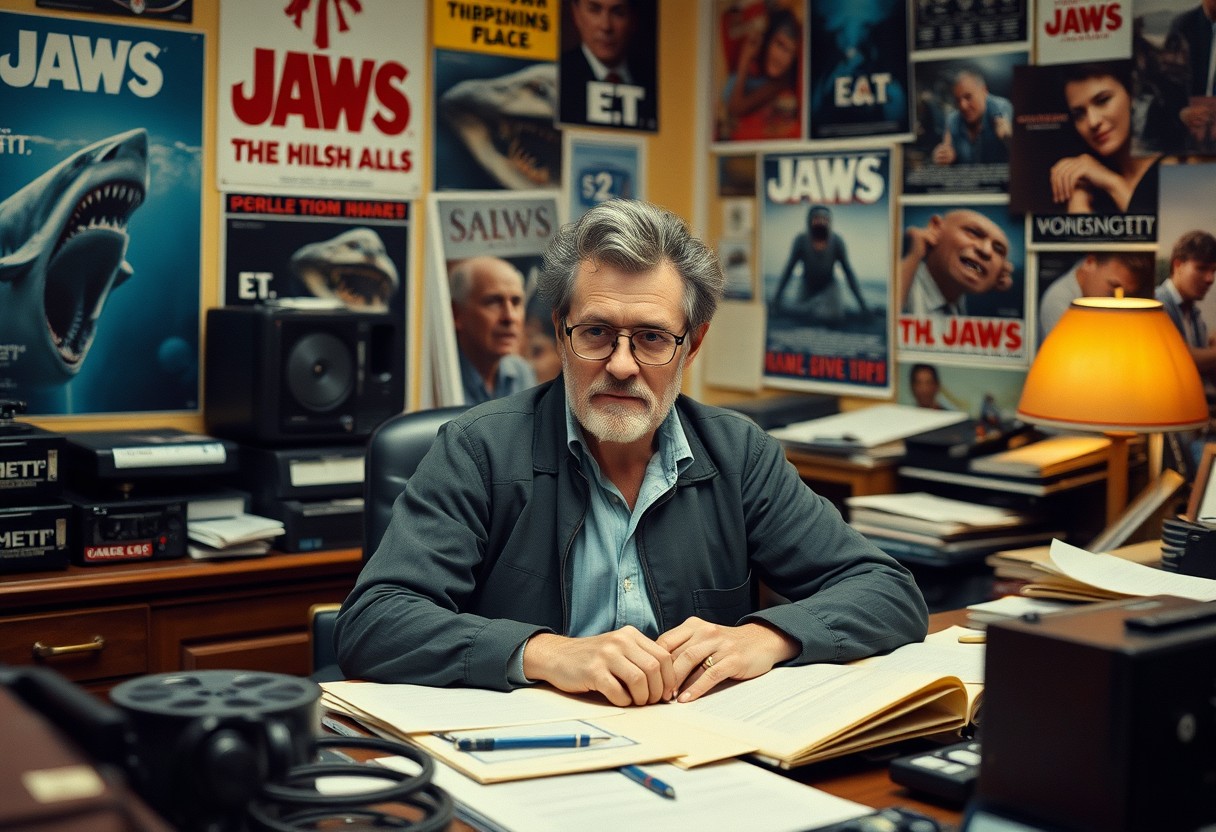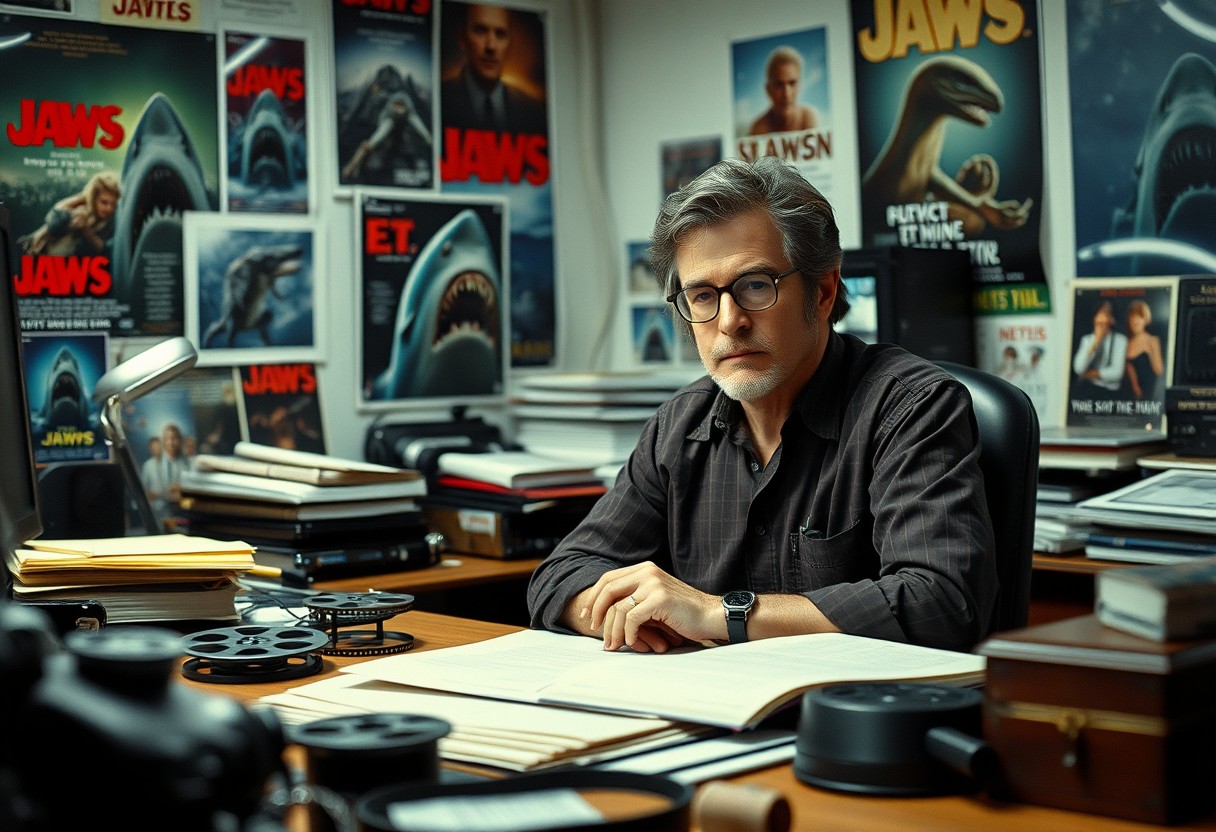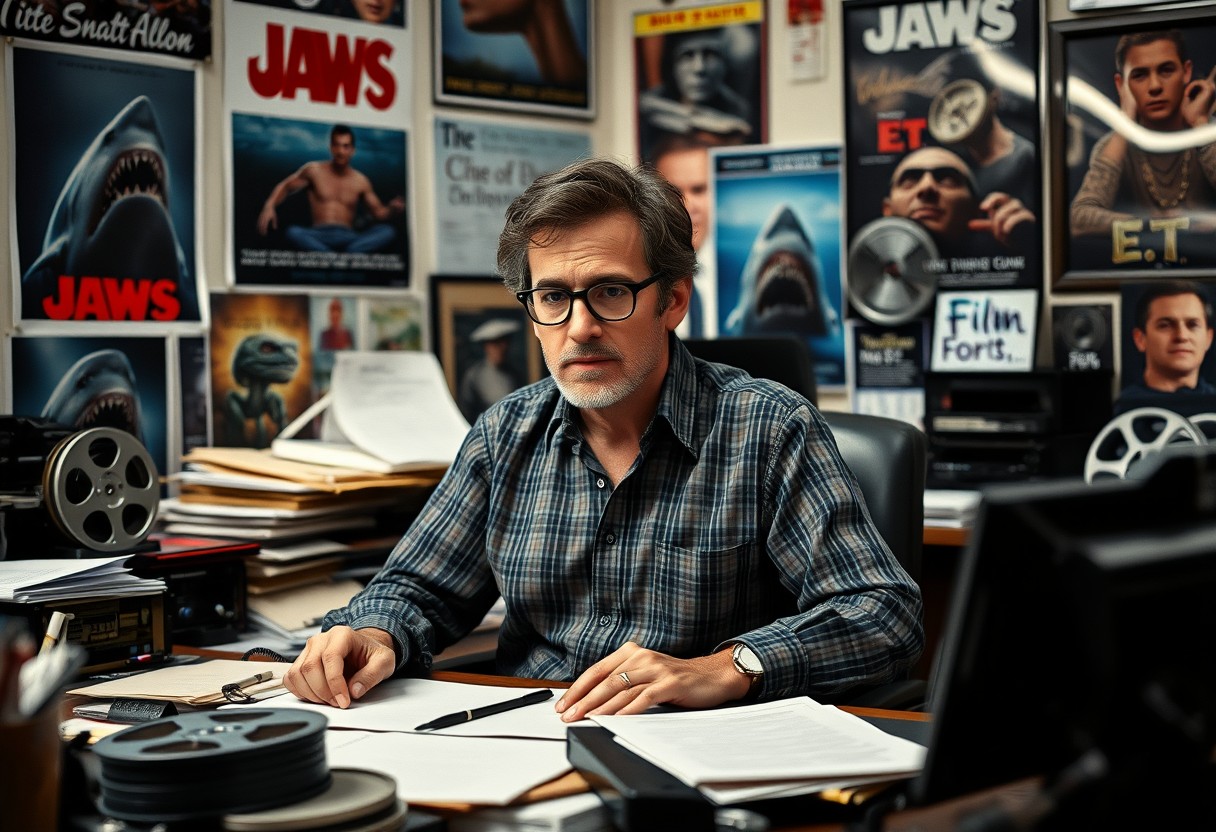Spielberg faced numerous challenges in his early career, including rejection and setbacks that might have deterred others. However, instead of allowing these obstacles to define him, he transformed them into motivational fuel that propelled his ascent in the film industry. You’ll discover how his resilience, along with a unique vision, helped him create iconic films that shaped modern cinema, proving that with determination, you can turn your own struggles into opportunities for success.

Key Takeaways:
- Resilience: Spielberg faced numerous rejections early in his career but used them as motivation to improve his craft.
- Innovative Storytelling: He embraced his unique vision and focused on telling compelling stories, which set him apart in the industry.
- Technical Skill Development: Spielberg constantly enhanced his technical skills, which allowed him to bring his creative ideas to life more effectively.
- Forging Relationships: He built strong connections with other industry professionals that played a significant role in his career advancement.
- Passion Projects: Spielberg pursued personal projects, such as ‘Duel’ and ‘Jaws’, which showcased his talents and captured the audience’s attention.
- Adaptability: He was willing to take risks and experiment with different genres, expanding his range as a filmmaker.
- Learning from Failure: Spielberg viewed setbacks not as losses but as opportunities for growth, leading to eventual success in his projects.
Early Life and Initial Struggles
A young Steven Spielberg faced numerous challenges in his early life, including the struggles of growing up in a Jewish family in an era of societal limitations. His passion for storytelling emerged during these formative years, driving him to create short films with his family’s camcorder. You can examine deeper into his fascinating journey in this #209 Steven Spielberg A Biography. Despite experiencing setbacks in the film industry, these hardships helped shape his resilience and vision for the future.
Childhood Inspirations
About Spielberg’s early interest in film was heavily influenced by his family, especially his father, who introduced him to storytelling. As a child, he found joy in crafting narratives, often staging elaborate adventures with his friends. These experiences not only fueled his imagination but also laid a robust framework for your filmmaking aspirations. The combination of family support and imaginative play ignited a creative spark that would soon evolve into a lifelong passion for cinema.
First Attempts at Filmmaking
Initial films like “The Last Gunfight” and his involvement in local television projects showcased Spielberg’s early attempts to break into filmmaking. Along the way, he encountered significant challenges, including criticism and rejection, but each setback offered valuable lessons that honed his craft. His first significant breakthrough came with the television movie “Duel,” demonstrating his potential and perseverance in the industry.
And as you examine into Spielberg’s journey, you’ll discover how he transformed disappointments into opportunities. The creative process for his initial films was not without peril, as he often pushed boundaries with experimental techniques. Each experience taught him the importance of persistence, which ultimately laid the foundation for his future successes. The initial setbacks served as stepping stones, empowering you to appreciate the resilience it takes to achieve greatness in the world of filmmaking.
Breakthrough with “Jaws”
Even amidst early failures, your determination paid off with the release of “Jaws,” which became a cinematic revolution. The film not only captivated audiences but also established Steven Spielberg as a master storyteller. This thrilling tale of a great white shark terrorizing a small beach town set the stage for blockbuster filmmaking, changing the face of Hollywood and shaping audience expectations for years to come.
The Making of “Jaws”
An ambitious vision met various challenges during the production of “Jaws,” including budget constraints and technical dilemmas with the mechanical shark. These obstacles forced Spielberg to innovate under pressure, ultimately shaping his directing style by emphasizing suspense and psychological tension rather than relying solely on special effects. His experience taught him to work smarter, using creativity to overcome limitations, which laid the groundwork for his future successes.
Impact on Hollywood
Above all, the release of “Jaws” changed Hollywood’s landscape, proving that blockbuster films could dominate the summer box office. Its unprecedented success encouraged studios to produce large-scale films centered on high-concept ideas, fundamentally shifting industry dynamics and audience engagement. Spielberg’s ability to create anticipation and excitement set a new standard for marketing in film (his strategic choice of a wide release was pivotal).
But the triumph of “Jaws” not only cemented *your* place in Hollywood but also initiated a new era of summer blockbusters defined by high stakes and superb storytelling. By masterfully blending *suspense, thrilling visuals,* and *an unforgettable score,* Spielberg’s vision captivated audiences and inspired generations of filmmakers (the decision to focus on character-driven narratives was significant). This film paved the way for the modern blockbuster formula, as studios recognized the immense potential for summer releases to attract mass audiences.

Adapting to Industry Changes
Keep in mind that Steven Spielberg’s ability to adapt to the film industry’s shifts played a significant role in his success. His early setbacks sparked a transformation in his filmmaking style, leading to the development of iconic suspense techniques and rich, character-driven narratives. You can see how he evolved with changing audience expectations, skillfully blending entertainment with deeper themes. (His decision to prioritize character over spectacle revolutionized blockbuster filmmaking.)
The Evolution of Spielberg’s Style
Industry trends were constantly shifting, challenging you to keep pace with evolving viewer desires. Spielberg faced skepticism regarding his direction, leading to a reevaluation of his approach. You could see this reflected in his films which, at times, combined humor with dramatic storytelling. Ultimately, he embraced the stakes of storytelling, utilizing tension and emotional depth to captivate audiences, despite facing doubts from critics. (He recognized the need for a more sophisticated narrative approach.)
Navigating Professional Challenges
Along the journey from the 1980s into the 1990s, you might find that Spielberg confronted numerous challenges, including critical reception of his films. The backlash against some of his works tested your determination as a filmmaker, but he took on constructive criticism, pushing himself to refine his craft. As a response, his films like “Jurassic Park” merged groundbreaking technology with gripping stories, showcasing his resilience. (His strategic decision to push the boundaries of visual effects highlighted the potential of cinema.)
To truly appreciate Spielberg’s journey, you can’t overlook how he navigated the professional hurdles during this transformative era. As audiences shifted toward more complex themes, you may feel his films began to reflect that sophistication, with deeper character explorations and social commentary. Embracing technology while refining his storytelling methods became a pivotal strategy. (This conscious shift altered his legacy and redefined mainstream cinema.)

Legacy and Contributions to Cinema
Despite facing numerous hurdles early in his career, Steven Spielberg’s impact on cinema is undeniable. His ability to weave compelling narratives with stunning visuals has set a standard that many strive to emulate today. From box office successes like *Jaws* and *E.T.* to critically acclaimed works like *Schindler’s List*, Spielberg has not only entertained but also educated audiences, establishing a legacy that continues to mold the film industry.
Influence on Future Filmmakers
Against the odds, your journey as a filmmaker can be influenced profoundly by Spielberg’s pioneering techniques and mentorship. Aspiring directors often cite his ability to blend genres and create emotional depth in characters as imperative learning points. His focus on character-driven stories alongside breathtaking visuals reshapes narratives in contemporary cinema, encouraging you to push boundaries in your projects. (One important decision you should consider is seeking mentorship from established filmmakers.)
Innovations in Film Technology
Filmmakers often look to Spielberg as a visionary who embraced and advanced film technology. His role in integrating CGI in films like *Jurassic Park* transformed how stories are told on the big screen, making previously unattainable visuals a reality. Spielberg’s relentless pursuit of innovation has shaped the filmmaking process, paving the way for new storytelling methods. (A significant decision for your projects is to stay updated on technological advancements in cinema.)
To seize every opportunity, embrace innovation as Spielberg did, as it is imperative for your growth and success as a filmmaker. His ventures into technologies like CGI have redefined the landscape of storytelling, enabling a new level of immersive experiences for audiences. Additionally, Spielberg championed collaboration with talented artisans and technicians, setting a benchmark for all aspiring directors. (Consider leveraging technology and collaboration to give your narratives a competitive edge.)
To wrap up
So, as you reflect on Steven Spielberg’s remarkable journey, you can see how his early setbacks shaped his resilience and creativity, ultimately guiding him to become one of Hollywood’s most celebrated directors. By turning challenges into opportunities, he not only refined his craft but also demonstrated the power of perseverance. You can take inspiration from his story, using your own obstacles as stepping stones toward success in your creative endeavors.
FAQ
Q: What early setbacks did Steven Spielberg face in his career?
A: Steven Spielberg faced several early challenges, including being rejected from the University of Southern California’s film school multiple times. Additionally, his first feature film, “Firelight,” was not commercially successful, and he struggled to gain recognition in a competitive industry.
Q: How did Spielberg’s rejection from film school influence his career?
A: Although being rejected from film school was disheartening, it motivated Spielberg to prove himself in different ways. He took the opportunity to create short films and pursue internships, which helped him gain hands-on experience and develop his unique storytelling style. These early projects showcased his talent and creativity, leading to opportunities in television and eventually film.
Q: What role did determination play in Spielberg’s success?
A: Determination was a significant factor in Spielberg’s journey. Despite facing numerous obstacles and setbacks, he remained focused on his goals. His commitment to his craft pushed him to constantly improve, seek new opportunities, and never give up on his dreams, ultimately leading to his success in Hollywood.
Q: How did Spielberg’s early experiences in television shape his directorial style?
A: Spielberg’s early experiences in television, particularly directing episodes for shows like “Night Gallery,” allowed him to refine his storytelling techniques and develop a strong visual style. These projects taught him how to work within tight budgets and time constraints, which later proved beneficial when he directed feature films.
Q: What impact did Spielberg’s perseverance have on his later projects?
A: Spielberg’s perseverance helped him to take creative risks and tackle ambitious projects that others might shy away from. His willingness to push boundaries and innovate in films like “Jaws,” “E.T.,” and “Jurassic Park” set new standards in filmmaking and continually redefined audiences’ expectations.
Q: Can you give examples of how Spielberg turned failures into successes?
A: After the lukewarm reception of his initial projects, Spielberg learned from his mistakes and evolved as a filmmaker. For example, he took the lessons from “Duel,” his breakthrough television film, and applied them to larger projects, which ultimately led to the phenomenal success of “Jaws,” his first major feature film.
Q: What can aspiring filmmakers learn from Spielberg’s journey?
A: Aspiring filmmakers can learn the importance of resilience, creativity, and adaptability from Spielberg’s journey. Embracing setbacks as learning experiences rather than failures can lead to personal growth and ultimately success. Additionally, focusing on consistent improvement and pursuing opportunities can open doors in an industry that is often challenging to navigate.
